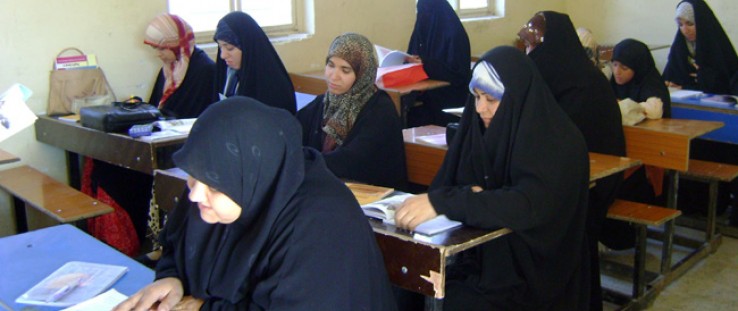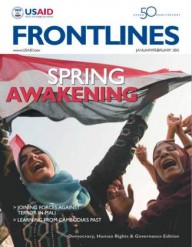 Iraqi women learn how to read and write in USAID’s Women’s Awareness and Inclusion Center in Basrah.
Mercy Corps
Iraqi women learn how to read and write in USAID’s Women’s Awareness and Inclusion Center in Basrah.
Mercy Corps
 Iraqi women learn how to read and write in USAID’s Women’s Awareness and Inclusion Center in Basrah.
Mercy Corps
Iraqi women learn how to read and write in USAID’s Women’s Awareness and Inclusion Center in Basrah.
Mercy Corps
Well before the start of the second Gulf War in 2003, rural Iraqi villages like Bizayez Abu Hallan lacked accessible drinking water, paved streets, health-care facilities, and other types of basic services that residents expect.
The residents of Bizayez Abu Hallan, located in the Kufa district of Najaf province in southern Iraq, were unsure how to change their situation until they witnessed how USAID projects affected neighboring communities. Their first priority was to upgrade their poorly maintained and dangerous electricity network based on a needs assessment. USAID contributed funds to purchase an electric transformer and wires while the village’s community action group appealed to the local electricity directorate to install the new equipment.
After successfully resolving the electricity issue, the action group persuaded provincial leaders to assist in other needed improvements such as providing a mobile health clinic, paving the village’s main road, and delivering a potable water supply for the village.
“Thanks to [USAID’s] cooperation in implementing the water project and the cooperation of the government in implementing the rest of the projects, we are now more optimistic about the future and extremely grateful for enjoying new services that we have not seen before,” said Aziz Huwen Atia, a member of the community action group.
Another success is a women’s literacy campaign started in a rural area in southern Iraq that, to date, has helped more than 23,000 women learn to read and write. This program has raised their awareness, empowering them to become more involved in their communities.
The ways in which Bizayez Abu Hallan leaders and other local communities have organized themselves effectively and used available resources to improve community living have been repeated thousands of times throughout Iraq in its urban centers, suburban areas, and isolated villages. These community action groups generally have grown from small, informal volunteer groups into larger, more sophisticated community organizations with elected leadership governed by bylaws.
Growing Action at the Grassroots
Since 2003, USAID’s Community Action Program, in coordination with initiatives of the Departments of State and Defense, has sought to help address Iraqis’ development needs at the grassroots level. The main goal of this effort has been to assist Iraqi communities to organize voluntarily, coordinate with local authorities, and prioritize and respond to community needs in a spirit of cooperation. Such empowerment was previously missing in Iraq, where there is a history of centralized government planning.
“USAID works with Iraqi communities from the ground up, where the most basic concepts of democracy, community mobilization, and conflict mitigation are being applied to refurbish schools, health clinics, and other items towns and villages need desperately. We’re proud of our ability to represent the ideals of the American people and help these communities help themselves in bringing relief to some of the most battered areas in Iraq,” said Alex Dickie, USAID/Iraq’s mission director.
As communication and joint planning with Iraq’s national, provincial, and local governments improve, the Iraqi government is contributing resources as well for projects put forward by USAID-supported community action groups.
Linking Grassroots to Government
In the northern Iraq provinces of Diyala, Kirkuk, Ninawa, and Salah ad Din, USAID has initiated new channels of communication and cooperation between communities and government. A series of meetings, conferences, and initiatives that took place in April and May 2011 brought together elected representatives, government officials, and ordinary Iraqis in a forum where local government and citizen groups could meet directly with provincial-level officials. The process allowed governors, line ministry officials, and provincial council members to learn what communities see as their top priorities and to exchange ideas on how they can improve outreach to their constituents.
As a result of the popularity and success of this initiative, the four provinces are now improving official accountability and public participation by adopting public meetings for proposed projects and budgets as official standard procedure. For the first time, constituents have an opportunity to support or oppose a measure and to propose solutions of their own. For many officials, including the wishes and aspirations of communities in their work is a new challenge; however, the rewards are becoming apparent.
“We are learning how to respond to citizens and how to accommodate different opinions. The public meetings in which I have participated allow community members to prioritize their projects and issues. These activities are now ongoing and have become part of my agenda. I appreciate being closer to the community and being able to support them in any way I can,” said Amir Khada Karam, council chairperson in Daquq, Kirkuk.
People Power in the Capital City
In Baghdad, representatives of the city’s 15 districts have helped draft formal community action plans for each district. The plans include hundreds of potential projects that residents say will improve their daily lives, from better health-care facilities and schools to assistance for widows, orphans, and the internally displaced. USAID supported discussions to draw up the strategic plans while residents and local and regional representatives debated the merits of the ideas.
More than 550 projects identified in these community action plans have been successfully completed in Baghdad since 2008, with more than 150 others expected to be planned and implemented during the next year. Each project undergoes rigorous design and oversight, ensuring community buy-in, government approvals and cost-sharing, and compliance with USAID vetting and transparency standards.
“Linking community action groups to district and provincial-level leadership has been one of USAID’s major accomplishments in Iraq,” said Alex Deprez, USAID/Iraq deputy mission director. “Now, the communities have a credible voice and are finally being heard, and their priorities are being considered as part of the larger district planning and budgeting process….USAID has launched an unprecedented model of local governance in Iraq.”









Comment
Make a general inquiry or suggest an improvement.